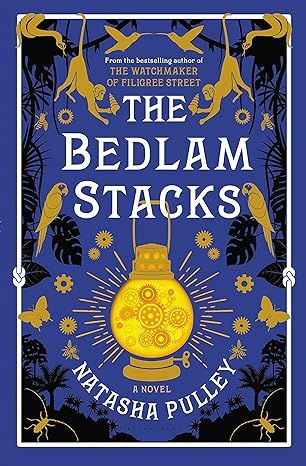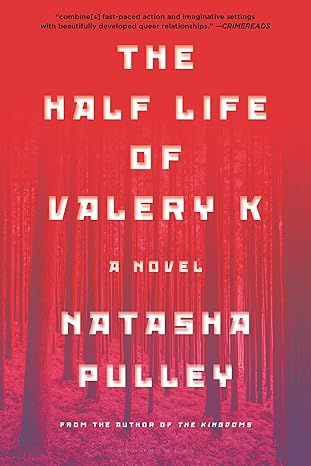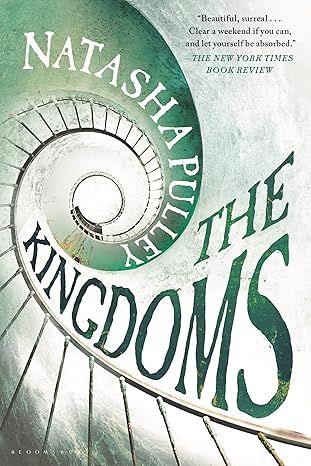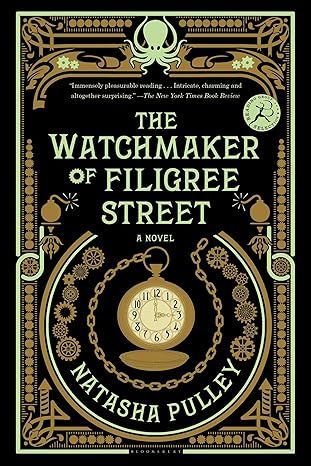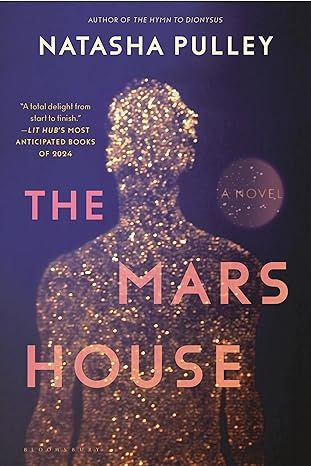The Bedlam StacksPaperback
4.4
-
1,985 ratings
An Indie Next Pick
Now in paperback, Natasha Pulley's "witty, entrancing novel . . . burnishes her reputation as a gifted storyteller" (Publishers Weekly, starred review).
In 1859, ex–East India Company smuggler Merrick Tremayne is trapped at home in Cornwall with an injury that almost cost him his leg. When the India Office recruits him for an expedition to fetch quinine--essential for the treatment of malaria--from deep within Peru, he knows it's a terrible idea; nearly every able-bodied expeditionary who's made the attempt has died, and he can barely walk. But Merrick is eager to escape the strange events plaguing his family's crumbling estate, so he sets off, against his better judgment, for the edge of the Amazon.
There he meets Raphael, a priest around whom the villagers spin unsettling stories of impossible disappearances, cursed woods, and living stone. Merrick must separate truth from fairy tale, and gradually he realizes that Raphael is the key to a legacy left by generations of Tremayne explorers before him, one which will prove more valuable than quinine, and far more dangerous.
Kindle
$9.99
Available instantly
Audiobook
$0.00
with membership trial
Hardcover
$25.63
Paperback
$11.34
Ships from
Amazon.com
Payment
Secure transaction
ISBN-10
1620409690
ISBN-13
978-1620409695
Print length
352 pages
Language
English
Publisher
Bloomsbury Publishing
Publication date
May 14, 2018
Dimensions
5.55 x 1.4 x 8.2 inches
Item weight
12.3 ounces
Product details
ASIN :
B06WVL16P8
File size :
2750 KB
Text-to-speech :
Enabled
Screen reader :
Supported
Enhanced typesetting :
Enabled
X-Ray :
Enabled
Word wise :
Enabled
Editorial reviews
"An epic journey . . . Pulley adroitly departs from the historical record to make the Peruvian story her own, turning it into a work for magic realism." - The New York Times Book Review
"The Peru that Markham and Tremayne encounter is a sheer fantastical delight. Exploding 'whitewood' trees, lamps made of glowing pollen, moving statues and rock formations of pure glass. Pulley also has a Tolkienian appreciation of the importance of cosiness: centrally heated ships' cabins, snug inns and lashings of hot coffee. What's more, she writes elegantly and plots like a pro." - The Times
"An immense treat for lovers of both historical fiction and the surreal." - The Observer, “Books of the Year”
"Eloquent prose and compassionate portrayals of the myriad relationships among men elevate this extraordinary work."- Publishers Weekly, “Best Books of 2017 – SF/Fantasy/Horror”
"The imagination [Pulley] showed in her impressive debut was no fluke . . . Pulley understands her genre--swashbuckling costume fantasy--but she deals in surprises, not clichés . . . [A] meditation on love, trust, and the passage of time." - Starred Review, Kirkus Reviews
"[A] witty, entrancing novel . . . Pulley makes the fantastic feel plausible and burnishes her reputation as a gifted storyteller." - Starred Review, Publishers Weekly
"Pulley is masterful at infusing The Bedlam Stacks with just the right amount of magical realism and mystery, making this story reminiscent of classic adventure tales of old while being relevant to today . . . Enchanting." - Shelf Awareness
"Pulley's beautifully descriptive language sets the stage for a mysterious and dangerous journey reminiscent of the grand scientific expeditions of the nineteenth century." - Booklist
"Impossible to put down until the end and highly re-readable, Pulley's second novel is magical." - San Francisco Book Review
"Natasha Pulley had a lot to live up to after the runaway success of her debut novel, The Watchmaker of Filigree Street. But she's managed to do just that with The Bedlam Stacks . . . It's a fast-paced adventure story with great characters and a message about colonialism and discovering new worlds . . . Filled with wondrous images, from moving statues to exploding trees." - The Glasgow Herald
"A fast-paced adventure story with great characters and a message about colonialism." - The Independent
"Natasha Pulley's captivating landscape unfolds slowly, her exquisitely crafted prose illuminating magical elements moving just at the edge of perception . . . The Bedlam Stacks is a lyrical paean to the power of transformation, faith and friendship." - BookPage
"[A] complex, immersive story . . . a marvelous mix of historical fiction and the fantastical." - Omnivoracious
"An exotic and magical mystery." - BookPage, "Top 10 Books for August"
"Fans of The Watchmaker of Filigree Street (who will be pleased that a character from that novel makes a cameo appearance) know that Pulley has a way with damaged characters who are looking for a new purpose in life. While there are steampunk elements, including clockwork lamps, there's also a subtle inexplicable magic running throughout the unusual, remote setting." - Library Journal
"A magical hugely imaginative novel set in 1859 . . . Adventure and mystery abound as his expedition encounters moving statues, exploding trees, volcanic glass, floating cities and protective Incas, while dealing with altitude sickness, divided loyalties and otherworldly superstitions that turn out be strangely real." - The Sunday Express
"The story's rich detail provides the reader a clear experience of 1850s Peru while imparting believability to its magic and imaginative elements. Its exciting style, humor and uniqueness are nothing short of charming. Enthusiastically recommended." - Historical Novel Society
"In The Bedlam Stacks, Natasha Pulley's unconventional imagination finds a new voice." - Locus
Read more
Sample
PART ONE
ONE
Heligan estate, Cornwall
August 1859
Although I hadn’t been shot at for years, it took me a long time to understand that the bang wasn’t artillery. I sat up in bed to look out of the window, half-balanced on my elbows, but there was nothing except a spray of slate shards and moss on the little gravel path three floors below. There had been a storm in the night, huge, one of those that takes days and days to form and gives everyone a headache, and the rain must have finally worked loose some old roof tiles. In its bell jar, which kept damp from the mechanisms, the clock thunked around to twenty past seven. I sat still, listening, because I’d been sure the noise had been much louder than a few smashed tiles.
The bunches of plants drying in the rafters were pattering seeds into their paper bags. Somewhere above them, on the roof, the weathervane squeaked. Nothing else fell. Once my heart was convinced there was no gunfire, I tried to slide my cane out from under the dog.
‘Gulliver.’ I gave it a tug.
She rolled over and lay at an unnatural angle while I got dressed, paws crooked under their own weight. When I stroked her ears, she bumped her nose into my stomach, trying to herd me back into bed. Gigantic anyway and overfed, she was as heavy as me and almost managed it, but even with a cane I could still just about outmanoeuvre a sleepy St Bernard.
‘No, sorry. Time for a walk,’ I said. ‘Let’s see if the greenhouse is still in one piece.’
She snorted at me but padded through the door when I opened it for her, my head bowed because the rafters were low. Outside were six steep steps which she took at an old lady’s pace, although in fact she was quite young. The way was so narrow that her sides touched the walls. There were polished parts on the wainscoting that represented a year of morning and evening passages, by far the most looked-after section of wall anywhere in the house. I eased down after her. My leg hurt but I got down four steps before I had to pause, which was a big improvement on six months ago.
Along the corridor were dislocated views over the gardens through windows whose panes had been made from patchworks of older stained glass, full of truncated bits of Latin and saints’ robes, all of them rattly on the windward side. The cold and the damp seeped in round the edges. When I came home after a long time away it was always freshly horrible that there were happy slugs and moss in the inside grooves, but I’d been back for long enough now to have lapsed into a hopeless effort not to see it.
Down the dark stretch on the next stairs – ten steps, none quite the same height – I ran my hand along the wall to keep my balance. The door at the bottom stuck fast at less than halfway open. Gulliver had to squeeze through and I turned sideways. Though the landing looked just as poky as the last, it led out suddenly on to the main staircase, where all the portraits of previous Tremaynes and Lemons hung down the left-hand wall. Nearer the top were people in army uniforms and nicely rumpled silk whose names I didn’t know, and down near the door of Charles’s study were the few I would have recognised out of context: a couple of our mother’s brothers, and the aunt who’d taught me to shoot. Last was our grandfather, who looked like me, blond and fast-ageing. A still-life of some fruit hung where our father should have been.
Now, there was a carpet of pine needles and broken bits of timber over the middle of the floor. I twisted round to see upward. Although there were, on my side, three floors to the house, on this side it was just galleries off the staircase. The ceiling was the roof. Being windowless, it was usually gloomy, with deep shadows between the vaults of the rafters, but now there was quite a big hole. Hanging down through it was a rotten branch still attached, just, to the old pine tree. It had been defying gravity for months.
I slid down the banister rather than bother with the stairs, and Gulliver lolloped down next to me. Through the hole in the ceiling, the old pine kept up its rain of needles. I watched it for a second before I went underneath, but nothing creaked.
Gulliver opened the front door by walking into it. She knew where she was going and trotted round to Charles’s study window, where she swept her tail to and fro over the gravel and sprayed me with rainwater because the path was full of puddles. So was the lawn. They were reflecting the sky, lavender and grey. From outside, the tree seemed more or less all right, except for the rotten branch still suspended over the hole in the roof. I still had no idea what it was, the tree. Some kind of sequoia, but it was white, like a silver birch, and it had grown monstrous. Despite its size, it had a stunted list that suggested it ought to have been ten times bigger, the white bark full of awkward knots and abortive half-grown branches with no needles on them. Up in the canopy was a whole parliament of nests. Although it was noisy in the mornings usually, the crows must all have been out doing crow things for now.
I tapped on Charles’s window. His shadow struggled up and swung across between his crutches. When he lined up with my reflection in the lilac morning light, we almost looked alike.
‘I’ll get some gardeners to go up and cut down that branch before it falls,’ I said through the glass, then leaned back as he shoved it open. The frame stuck and it needed some force. ‘What are we doing about the roof?’
‘We’re not doing anything about the roof,’ he said, ‘and I’d rather not have gardeners in the house.’
‘I’d rather not have a tree in the house,’ I said, ‘so stay there and don’t look.’
I heard a saw. There were gardeners by the tree, just beginning to cut the trunk. I hadn’t seen from the front door, which stood at the wrong angle, but they had already tied ropes round the far side to guide the fall.
‘What are they doing?’ I said slowly.
‘Cutting it down. You’re right, it’s not safe. And this way we can have some firewood we’re not paying for.’
I didn’t say that making firewood from that tree was like using pound notes for kindling, or worse, given the effort it had taken to bring it here. It was from Peru and our grandfather had built one of the greenhouses specially for it. But I knew what Charles would say. He would say it wasn’t pound notes; it might have cost a lot to bring and to grow, but the tree wasn’t worth anything now it was here. It would be like burning rupees if you never intended to go to India again and didn’t know anyone else who would.
‘Charles, you can’t,’ I tried, with no heart.
‘We’re past keeping things from sentiment.’
‘As opposed to the ten generations’ worth of rubbish taking up eighteen of twenty rooms inside—’
‘Ridiculous thing to have planted by the house in any case. The roots are coming up through the kitchen floor, for God’s sake.’
I let my breath out and tried not to feel angry. That I’d grown up among the roots of that tree, that Dad had climbed it with me and read me stories in the lowest branch; none of it meant a thing to him and there would be no making him understand. He had hated our father and that was that. He had hated him so much that if I said I hadn’t, he couldn’t conceive that it might be anything but a strange lie.
‘They can save some of the timber to plank up the roof, then,’ I said.
‘Merrick, I told you, we can’t afford to do anything about the roof; I can’t have workmen in—’
‘There’s a hole in the bloody roof, Charles, and we’ve got timber. We’ve got eleven gardeners.’
‘Don’t swear at me. It should be done properly—’
‘But we can’t do it properly, you just said.’
‘Just,’ he said, ‘leave it alone.’
I laughed. ‘I’m not being rained on every time I come into the house because you’re too proud to fix the roof. Talk about spiting your face.’
‘I don’t mind rain,’ he said.
‘Other people do.’
‘Merrick. I said—’
‘I heard what you said, but since what you said was stupid, we’re not going to do that.’
He ignored me. ‘There’s a letter for you.’
I managed to hesitate only for a second when I saw the seal of the India Office before I folded it into my waistcoat. I liked fighting with Charles – if I was disagreeing with him it was proof I hadn’t been beaten down altogether yet – but seeing the seal made the scar on my leg pang and I had to go more slowly.
Read more
About the authors
Natasha Pulley
Natasha Pulley was born in Cambridge. She read English Literature at Oxford before doing an MA in Creative Writing at the University of East Anglia. In 2013 she went to Japan on a scholarship from the Daiwa Anglo Japanese Foundation. She lived in Tokyo for a year and a half, learning Japanese and researching her first book, 'The Watchmaker of Filigree Street'. She spent several months in Peru courtesy of a travel grant from the Society of Authors, chasing llamas and researching 'The Bedlam Stacks', and more recently, spent some time in Shanghai studying Mandarin for 'The Mars House'. She lives in Bristol.
Read more
Reviews
Customer reviews
4.4 out of 5
1,985 global ratings
SonjaBRoch
5
What a wonderful sequel to "The Watchmaker of Filigree Street". An author to look to.
Reviewed in the United States on August 11, 2017
Verified Purchase
Ms. Pulley's first book, The Watchmaker of Filigree Street, is a wonderful book, with strange and familiar and strangely familiar characters and a great deal of subtle wonder all around. The characters all grow toward and away from each other. The Victorian setting is very well done, with the Japanese exhibition opening up that straightened London.
The Beldam Stacks is even more wonderful. As a reader I had such ambivalence about the European characters, sometimes endearing, sometimes crass, sometimes near transcendent. But the place, the stacks, that realistic magic just floored me. I dreamed phantastic dreams while reading this, architectural and biological and glowing.
The central mystery reminded me of "The Stress of Her Regard" by Tim Powers, but The Stacks though serving up constant danger are less fraught and far more exotic than nephilim haunted Europe.
I love books like this. I call them "rabbit hole" books because I just fall right down them, never once considering how to get out. And life after waking up is a little tattier around the edges.
Read more
28 people found this helpful
Digit Head
5
Awesome
Reviewed in the United States on November 29, 2023
Verified Purchase
The writing is beautiful. For a reader with somewhat limited imagination to this genre, I felt immersed and the author is the key.
Liz Heywood
5
Excellent vendor
Reviewed in the United States on April 7, 2024
Verified Purchase
Great quality, low price, arrived sooner than expected.
Amazon Customer
5
one of the best new books I’ve read this year
Reviewed in the United States on September 29, 2023
Verified Purchase
The incredible writing . . .I read the Kindle sample and immediately bought the book. Fascinating plot; what I think I liked the best was the psychological intricacies. The touches of magical realism ran glimmering through the book like fine gold embroidery. Just~beautiful. If you haven’t read it yet, I envy you. About to go load up on everything else Natasha Pulley’s written, and preorder her new one coming out early next year.
Read more
2 people found this helpful
Sarah Rocklin
5
Another beautiful adventure from Ms. Pulley
Reviewed in the United States on August 25, 2017
Verified Purchase
I fell in love with Natasha Pulley's first book, The Watchmaker of Filigree Street, and was so excited when I saw she had this second book out. And I loved this one just as much as the first!
The book made me think of the sort of adventure stories written by John Buchan, or H. Rider Haggard's stories about Allan Quartermain (for younger readers of this review who may not recognize those names...think Indiana Jones)...stories of adventure and exploration but written with an earlier-than-21st-century sensibility. A lot of the reviews here mention that the book is slow...I would say more that it is a deliberate build-up. There are hints of strange very early on, before the main characters adventures even start, and those hints build and build. The supernatural here is almost explainable...could almost be something that would occur in our own world.
But it's the characters that I love especially, wounded (mentally and physically) Merrick and Raphael of course, Clement, even the people of the stacks - Inti, Aquila. And the marvelous reappearance of a character from Watchmaker. They are so real and their relationships so well drawn. And the world they inhabit is beautifully described. I'd love to see the stacks, with their obsidian inclusions...I'd love to write messages in the glowing pollen...
I'll just have to wait for Ms. Pulley's next book, I guess.
Read more
10 people found this helpful
Top Natasha Pulley titles
View allBest Sellers
View all
The Tuscan Child
4.2
-
100,022
$8.39

The Thursday Murder Club: A Novel (A Thursday Murder Club Mystery)
4.3
-
155,575
$6.33

Sapiens: A Brief History of Humankind
4.6
-
140,302
$13.49

The Butterfly Garden (The Collector, 1)
4.3
-
88,556
$9.59

Things We Hide from the Light (Knockemout Series, 2)
4.4
-
94,890
$11.66

The Last Thing He Told Me: A Novel
4.3
-
154,085
$2.99

The Perfect Marriage: A Completely Gripping Psychological Suspense
4.3
-
143,196
$9.47

The Coworker
4.1
-
80,003
$13.48

First Lie Wins: A Novel (Random House Large Print)
4.3
-
54,062
$14.99

Mile High (Windy City Series Book 1)
4.4
-
59,745
$16.19

Layla
4.2
-
107,613
$8.99

The Locked Door
4.4
-
94,673
$8.53
